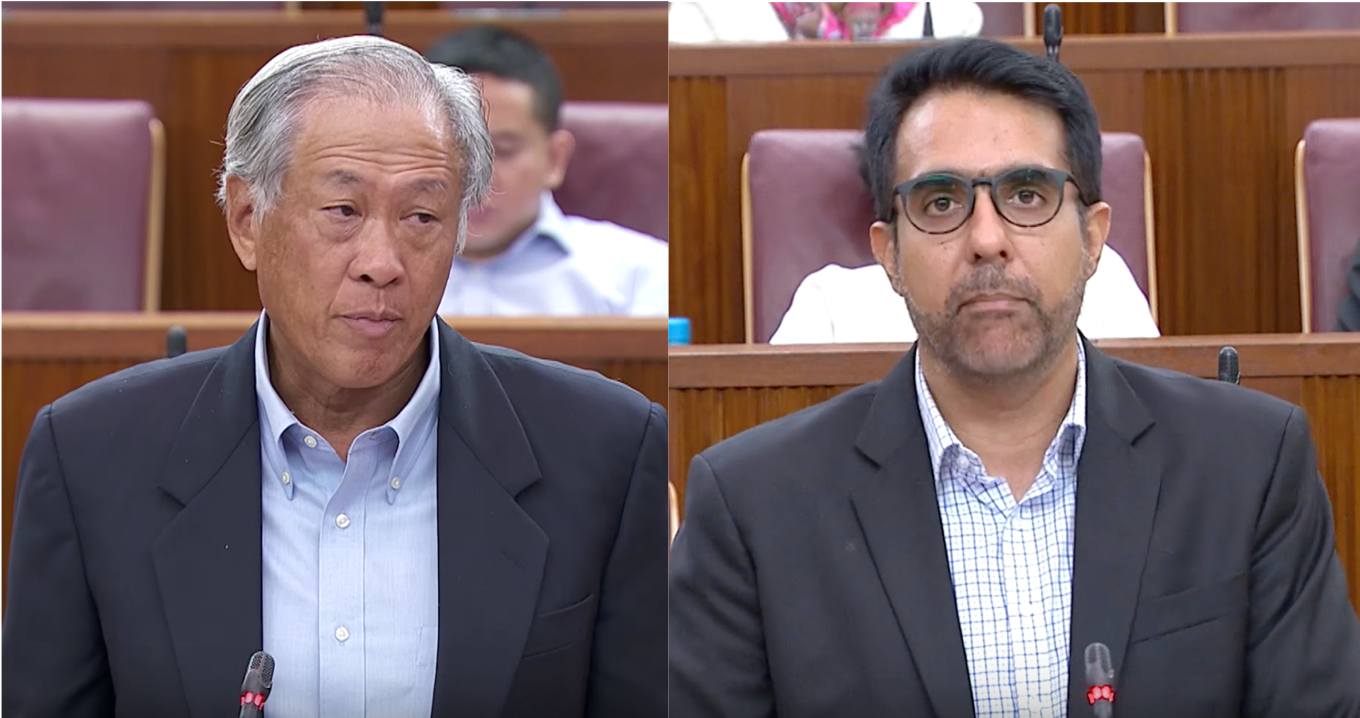Workers' Party Secretary-General Pritam Singh and Defence Minister Ng Eng Hen managed to find some common ground in Parliament in their views of National Service (NS) and the importance of safety.
However, they disagreed on other issues -- including changing the laws to allow the Ministry of Defence (Mindef) to be sued.
Zero-training deaths is not realistic
Speaking in Parliament on Feb. 11, Singh called an Adjournment Motion and outlined three themes:
- Training safety
- Operational readiness
- The will to fight
Singh said that training safety should be of the utmost importance for Mindef.
In his view, Ng's stated goal of zero training fatalities is "unrealistic" and "wishful".
He gave the example of the aviation industry still experiencing accidents despite very strict safety standards.
Due to such high expectations, Singh believes that in the event of a training fatality, public pressure on Mindef and the Singapore Armed Forces (SAF) commanders takes on a "corrosive edge".
This damages not just the SAF, but the institution of NS itself.
Zero tolerance must be aimed for
In his reply, Ng said he agreed with Singh that NS is crucial to Singapore's survival.
Both MPs also believe it is crucial to make training as safe as possible.
However, Ng disagreed with Singh's view that aiming for zero fatalities was unworkable.
He said:
"Zero fatalities is a very difficult target, and as Mr Pritam Singh said, it may be impossible. But we have to aim for it and as our own experience shows, in some years, we will be able to achieve it."
He cited the experience of a former Chief of Air Force, Lt-Gen (Ret) Bey Soo Khiang.
Bey recalled his experience in the early days of the Air Force, and how it had managed to drastically reduce the losses of its fighters over the years.
He felt he had a duty to his men and their families to try his best to prevent training mishaps.
Also, such accidents sapped citizen confidence in their military, and undermined the deterrence factor to outside threats.
Ng believes that having a goal of zero fatalities will "sear into the consciousness" of every commander and soldier that safety lapses will not be tolerated.
Revamp the military
In his motion, Singh proposed a number of changes he felt would improve the military's situation.
First, he suggested that the retirement ages of the Officer and Warrant Officers, Specialists and Enlistees (WOSE) corps could be extended.
This will enable them to acquire deeper operational knowledge and improve safety standards.
Second, he suggested that due to the smaller cohort of 18-year-olds enlisted for NS, and extra reliance on new technology and machinery, extra training should be mandated for live-firing and maintenance exercises.
To compensate for these extra training, the SAF may have to cut back on its non-core, non-training duties.
Review Section 14
Finally, Singh suggested that the government review Section 14 of the Government Proceedings Act, which stops lawsuits being filed out against Mindef.
He recommended an exception to be carved out to withdraw immunity from Mindef or a negligent commander in the event of an egregious breach of safety.
He believed that this would create greater accountability, instead of undermining Mindef.
Singh said:
"But the significance of this proposal to tweak Section 14 of the Government Proceedings Act does not lie in the fact that MINDEF or and any irresponsible commander can be sued.
Paradoxically in fact, such a change -- legislatively determined -- would serve to protect the institution of National Service by making it more accountable instead of undermining it."
Singh felt that this would send a clear message that the buck stops at the top, even if it means putting Mindef's reputation on the line.
"Misses the point"
However, Ng disagreed with Singh's suggestion on reviewing Section 14.
He called it a "tangential argument" that "misses the point".
Ng believes that commanders who make mistakes are indeed held accountable, with guilty soldiers receiving the punishment they deserve.
Ng said:
"I have told you many times and we have taken commanders or national servicemen who have been derelict, who have not done their duty, to criminal prosecution.
Not just civilian payouts in the courts; they go to jail. Their lives, in that sense, and careers are ruined. And justly so, they deserve it."
Ng also disagreed with the premise that not reviewing Section 14 meant that he was concerned about Mindef's reputation.
Ng added:
"Mr Singh says, do not be afraid of Mindef’s reputation. I am not afraid of Mindef’s reputation. I am more concerned about individual lives, about how our commanders, at any given moment of time, watch for the safety of their national servicemen, of the people under their charge and yet at the same time, conduct realistic training."
Related stories:
Top image adapted from Gov.sg's YouTube Channel.
If you like what you read, follow us on Facebook, Instagram, Twitter and Telegram to get the latest updates.
